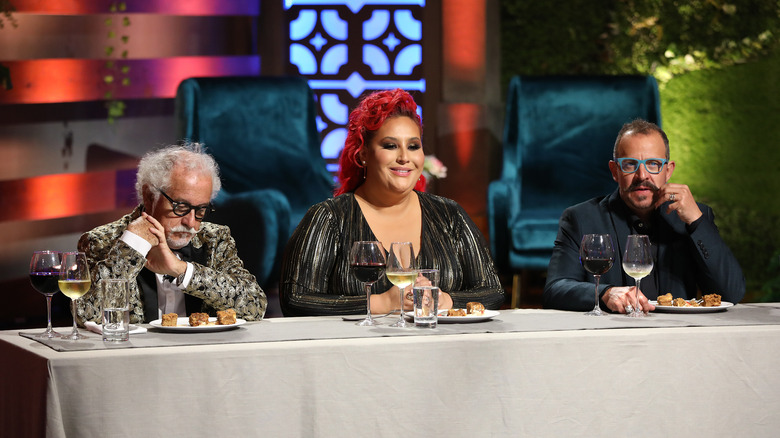The Process Of Landing A Spot On MasterChef Is Fascinatingly Odd
The prospect of doing well on the cooking reality show "MasterChef" can mean increased exposure and a boost to business, especially if you're one of the "MasterChef" winners. But competing on the show is certainly no cakewalk. Before cameras start rolling, contestants have to earn their spot, and the audition process can be grueling. Though "MasterChef" began as a British show, the format was adapted for American audiences, and some of the differences in production can be seen in the application process.
On the "MasterChef" U.S. website, the show's staff explains that producers evaluate applicants' passion, skill, and willingness to participate in life-changing opportunities. Shortlisted candidates are then invited for a test screening, and the final roster of chefs is selected after the footage is reviewed. As season 3 hopeful Jessie Glenn recounted to Salon, after a video was sent in and an audition cooking session was recorded, a thick stack of paperwork was sent for her to complete.
Glenn observed that some applicants were recruited without having to audition, yet she spent hours participating in a personality test, meeting with a private detective, and even sending in blood samples before liability waivers and contracts were issued. Season 2 contestant Ben Starr detailed his similar experience in a blog post (via Quora). He described standing in line with 100 other contestants waiting to plate a signature dish to present it to an unknown assembly of casting agents, producers, and instructors. Starr, too, recalls several months of interviews, evaluations, investigations, and blood tests collected for DNA sequencing.
When production and competition collide
Some Quora users have observed that the American version of "MasterChef" emphasizes competition, while British tapings focus on a more friendly culinary showcase. One Quora writer noted a similar approach in the Australian show. "There was a period around Season 4 or 5 when they attempted to inject false drama into the show by selecting contestants that would clash. However, this was an unmitigated disaster, with ratings dropping and the format suffering," Darren McSweeney wrote. "Since about Season 6, the producers have explicitly stated they will not select contestants to create drama on the show and have been quite faithful to their word."
For personal chef Theodore Chana, participating in the British version of "MasterChef" began with an online application. "You need a certain amount of experience, you need to be clued up, and you need the time to invest to apply," Chana told Tasting Table. Once he passed the initial audition stages and his sample dish was favorably reviewed, he was brought to set to film. "It was a surreal moment," Chana recalled. "They said, 'Look, put this apron on and walk through the door.' As soon as I did, it was lights, cameras, and three judges staring at me."
To those chefs interested in participating in "MasterChef," guest judge Tanya Holland emphasizes practice. "Cook some of your favorite dishes over and over again, and kind of memorize things," Holland told Mashed in an exclusive interview. After all, once enduring the application process, "MasterChef" cooks must be ready to perform.
Static Media owns and operates Tasting Table and Mashed.

